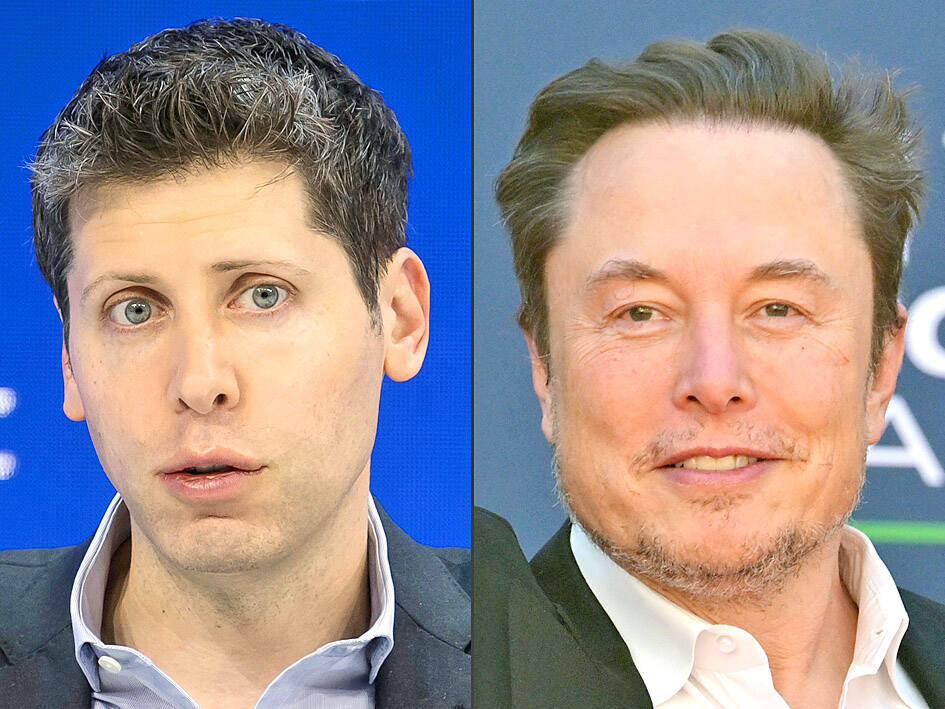A group of investors led by Elon Musk has offered to buy the nonprofit that controls OpenAI for US$97.4 billion, escalating a clash between the Tesla Inc chief executive and the artificial intelligence (AI) company he cofounded.
With the unsolicited bid, Musk said in a statement that he hoped to return OpenAI to being “the open-source, safety-focused force for good it once was.”
In response, OpenAI CEO Sam Altman posted on Musk’s X social-media platform: “No thank you but we will buy twitter for US$9.74 billion if you want.”

Photo: AFP
Musk acquired Twitter for US$44 billion, but its value later diminished, according to outside estimates.
The bid is being backed by Musk’s own AI start-up xAI, which could merge with OpenAI following a deal, the Wall Street Journal reported.
According to a statement from Marc Toberoff, a lawyer representing the investors, other backers of the proposal include Valor Equity Partners, Baron Capital, Atreides Management, Vy Capital, Joe Lonsdale’s 8VC and Ari Emanuel, through his investment fund.
It is difficult to determine how serious Musk’s bid is and what his motivation was for making it, Telluride Legal Strategies LLC founder Rob Rosenberg said.
Even if it is not successful, Musk’s move could potentially complicate OpenAI’s effort to transition from being a nonprofit entity into a multibillion-dollar for-profit AI giant — a transformation Musk has opposed.
“I think he’s trying to make a statement and bring more attention to the fact that OpenAI is still on this course to switch from being a nonprofit to a for-profit company,” Rosenberg said.
In the statement, Toberoff indicated one motivation for the bid: to place outside pressure on OpenAI while it determines a value for parts of its business while transitioning to a for-profit entity.
“That value cannot be determined by insiders negotiating on both sides of the same table,” he wrote. “After all, the public is OpenAI Inc’s beneficiary, and a sweetheart deal between insiders does not serve the public interest.”
Musk and Altman have been locked in a long-standing feud over the direction that OpenAI has taken since its founding. Musk has alleged that the start-up has abandoned all pretense of proceeding as a charity to benefit humanity with a focus on openness and safety.
OpenAI has rejected that characterization, and last year said that Musk was lashing out after an earlier failed attempt to make the company part of his automaker Tesla.

South Korea’s equity benchmark yesterday crossed a new milestone just a month after surpassing the once-unthinkable 5,000 mark as surging global memory demand powers the country’s biggest chipmakers. The KOSPI advanced as much as 2.6 percent to a record 6,123, with Samsung Electronics Co and SK Hynix Inc each gaining more than 2 percent. With the benchmark now up 45 percent this year, South Korea’s stock market capitalization has also moved past France’s, following last month’s overtaking of Germany’s. Long overlooked by foreign funds, despite being undervalued, South Korean stocks have now emerged as clear winners in the global market. The so-called “artificial intelligence

NEW IDENTITY: Known for its software, India has expanded into hardware, with its semiconductor industry growing from US$38bn in 2023 to US$45bn to US$50bn India on Saturday inaugurated its first semiconductor assembly and test facility, a milestone in the government’s push to reduce dependence on foreign chipmakers and stake a claim in a sector dominated by China. Indian Prime Minister Narendra Modi opened US firm Micron Technology Inc’s semiconductor assembly, test and packaging unit in his home state of Gujarat, hailing the “dawn of a new era” for India’s technology ambitions. “When young Indians look back in the future, they will see this decade as the turning point in our tech future,” Modi told the event, which was broadcast on his YouTube channel. The plant would convert

‘SEISMIC SHIFT’: The researcher forecast there would be about 1.1 billion mobile shipments this year, down from 1.26 billion the prior year and erasing years of gains The global smartphone market is expected to contract 12.9 percent this year due to the unprecedented memorychip shortage, marking “a crisis like no other,” researcher International Data Corp (IDC) said. The new forecast, a dramatic revision down from earlier estimates, gives the latest accounting of the ongoing memory crunch that is affecting every corner of the electronics industry. The demand for advanced memory to power artificial intelligence (AI) tasks has drained global supply until well into next year and jeopardizes the business model of many smartphone makers. IDC forecast about 1.1 billion mobile shipments this year, down from 1.26 billion the prior

People stand in a Pokemon store in Tokyo on Thursday. One of the world highest-grossing franchises is celebrated its 30th anniversary yesterday.